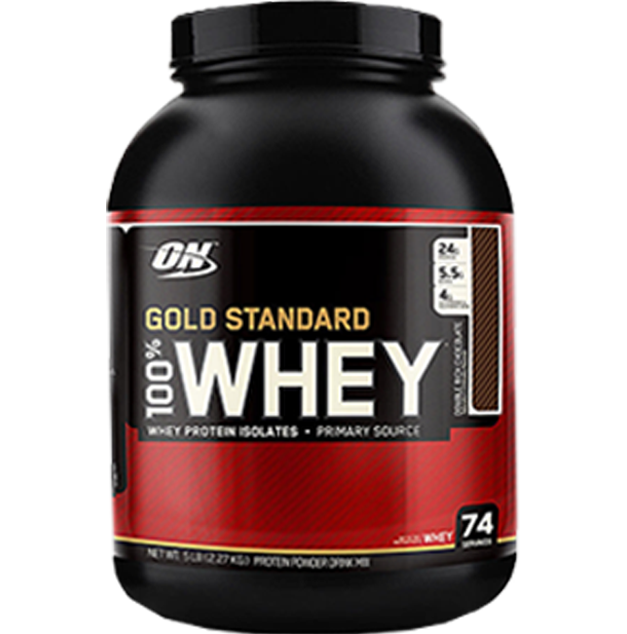Quick Summary Points
- Optimum Nutrition's Gold Standard 100% Whey is the world's best-selling protein and one of the best on the market.
- It's a simple, blended whey protein that works well as an everyday protein or a pre or post-training shake.
- More common side effects of increased consumption though may be bloating, flatulence (farting), gastrointestinal discomfort, stomach cramps & diarrhoea.
- More uncommon side effects may include headaches, fatigue, weakness or nausea.
- These side effects aren't very common, however, thanks to the added enzymes and the use of different proteins in Optimum Gold Standard Whey.
- Lactose & dairy sensitivity, or pre-existing medical conditions including protein intolerances are the major underlying causes of Gold Standard Whey Protein side effects.
- Unless you have kidney issues, there's no need to worry about increased protein consumption.
 Introduction: Optimum 100% Whey Protein Side Effects
Introduction: Optimum 100% Whey Protein Side Effects
Optimum Nutrition is one of the top sports nutrition brands on the market. 100% Whey is the number one selling protein worldwide, helping maintain the company's reputation as a maker of some of the best supplements out there. Unfortunately, there is no getting around the fact that even the highest quality, most popular, and most beneficial products do occasionally come with side effects.
Let's look at some of the potential symptoms users of Optimum Nutrition 100% Whey Protein may encounter.
A Quick Review: Optimum 100% Whey Protein
Optimum Nutrition 100% Whey Protein is a blend of whey protein isolate, whey protein concentrate and whey peptides. As the name suggests, this product contains very little apart from protein, with cocoa, flavourings, sweeteners, and digestive enzymes completing the ingredient list. Despite the presence of Aminogen®, an enzyme that assists in the digestion of protein, and lactase, which breaks down lactose, the most common side effects associated with Optimum 100% Whey still concern protein & lactose.
Optimum Gold Standard Whey Protein: The Most Common Side Effects
Whilst side effects from Gold Standard Whey are very uncommon, they are still possible, especially should you have a pre-existing medical condition.
The below list provides the most common side effects that are possible:
- Stomach Bloating
- Intestinal Gas
- Stomach Discomfort
- Increased Bowel Movements
- Diarrhea
There is also a small list of uncommon side effects that users may experience:
- Headaches
- Nausea
- Fatigue & Weakness
Again and for clarity we confirm that side effects from Optimum Gold Standard Whey Protein are not to be expected. That is unless you have a medical condition or are sensitive to dairy products.
Side Effects of Optimum Whey Protein: Lactose Intolerance
Lactose intolerance is an issue that affects a large number of people. It is generally a hereditary condition, thought to affect about 5% of Australians from European backgrounds and a larger percentage of those who hail from areas such as Asia and the Middle East (1). Lactose intolerance is caused by the underproduction of the enzyme lactase, which breaks lactose down into glucose. If lactose is not broken down, it passes through the digestive system where it may cause uncomfortable symptoms like stomach cramps, diarrhoea, bloating, and excessive flatulence.
While Optimum Nutrition 100% Whey contains whey protein isolate, and whey peptides, which are very pure forms of whey that are mostly free from lactose, it also contains whey protein concentrate, which is known to contain residual lactose.
Lactose intolerance varies in severity, and many people will be able to handle the small amount of lactose in this product, particularly with the addition of extra lactase, but there are other people who may experience some side effects. People with a severe intolerance to lactose should try a whey protein isolate, like Optimum Gold Standard Isolate.
Whey Protein Gold Standard Side Effects: Protein Intolerance
Along with Carbohydrates and Fat, Protein is one of the three essential macronutrients which people must consume to remain in good health. A high protein diet can build muscle and assist with weight loss, and protein powder is a great way to supplement your protein intake and ensure you are obtaining sufficient amounts of this nutrient. There is, however, a limit to the amount of protein our bodies can digest at one time. Similarly to lactose, if protein passes through our gut undigested, it can cause unpleasant gastric side effects like bloating, diarrhoea, flatulence and cramps. It is thought that the maximum rate of protein absorption by the gut is about 8-10 g per hour (2). While 100% Whey Gold Standard contains whey peptides, a pre-digested form of protein, and Aminogen, a digestive enzyme that helps increase the amount of protein our bodies can absorb (3), the effects of protein intolerance may present themselves in some people. Thankfully, these can be controlled by taking more frequent, smaller doses of protein.
Intolerance to proteins may be exacerbated by the presence of extra amino acids like glycine. Undigested amino acids can draw water into the gut, causing diarrhoea. Because Optimum Nutrition 100% Whey is all protein, unadulterated with extra amino acids, this type of side effect is not an issue.
Side Effects of Whey Protein Powder: Milk Protein Allergy
 Allergy to milk protein is a condition that is distinct from lactose intolerance. Most people who suffer from this condition will have been diagnosed by a doctor, and most sufferers will know not to consume milk products, including whey protein. While lactose intolerance is caused by the incomplete digestion of lactose, milk protein allergy is caused by the body's immune system mounting an attack against the dairy protein. Allergic symptoms commonly include rash, wheezing, and gastric distress, but can, in some cases be severe, extending to tachycardia and anaphylactic shock. People who suspect a dairy allergy are advised to stop eating dairy protein and consult their doctor immediately.
Allergy to milk protein is a condition that is distinct from lactose intolerance. Most people who suffer from this condition will have been diagnosed by a doctor, and most sufferers will know not to consume milk products, including whey protein. While lactose intolerance is caused by the incomplete digestion of lactose, milk protein allergy is caused by the body's immune system mounting an attack against the dairy protein. Allergic symptoms commonly include rash, wheezing, and gastric distress, but can, in some cases be severe, extending to tachycardia and anaphylactic shock. People who suspect a dairy allergy are advised to stop eating dairy protein and consult their doctor immediately.
Optimum 100% Whey Protein Side Effects: Kidneys
There are a number of rumours about the side effects of protein consumption. One of the most prevailing of these is the idea that protein consumption can damage the kidneys. A great deal of research has been conducted into this claim, and studies have shown that healthy people can consume very large amounts of protein, up to 2.8g/kg body weight per day, with no effect on renal health (4). Anybody who is worried about their kidney function, or uncertain about the effects of protein on their health, is advised to consult a doctor before using Optimum Nutrition 100% Whey Protein.
Conclusion: The Side Effects from Optimum Gold Standard Whey Protein
In conclusion, Optimum Nutrition 100% Gold Standard Whey Protein is a high-quality product that contains very little apart from protein, cocoa, flavourings, sweeteners & digestive enzymes completing the ingredient list. While side effects are not to be expected, they are still possible, especially if the user has a pre-existing medical condition or is sensitive to dairy products. The most common side effects associated with Optimum Gold Standard Whey are stomach bloating, intestinal gas, stomach discomfort, increased bowel movements & diarrhea.
Lactose intolerance is also a potential issue for some users, and in severe cases, a whey protein isolate like Optimum Gold Standard Isolate may be a better choice. Protein intolerance and milk protein allergy are also possible side effects, although they are uncommon in undiagnosed protein powder users. Finally, there is no evidence to support the claim that protein consumption can damage the kidneys, & studies have shown that healthy people can consume very large amounts of protein without negative effects.
Overall, Optimum Nutrition's Gold Standard 100% Whey Protein is a safe & effective powder for most people, users should however be aware of the potential side effects & consult their doctor if they have any concerns.
(1) Lactose Intolerance. Dietitians Association of Australia. http://daa.asn.au/for-the-public/smart-eating-for-you/nutrition-a-z/lactose-intolerance/. Accessed 11th August 2014
(2) Bilsborough S, Mann N: A review of issues of dietary protein intake in humans Int J Sport Nutr Exerc Metab 2006, 16(2):129-152.
(3) Julius Oben, Shil C Kothari and Mark L Anderson. An open-label study to determine the effects of an oral proteolytic enzyme system on whey protein concentrate metabolism in healthy males. Journal of the International Society of Sports Nutrition 2008, 5:10
(4) Poortmans, J.R. and Dellalieux O. (2000) Do regular high protein diets have potential health risks on kidney function in athletes? International Journal of Sport Nutrition & Exercise Metabolism 10, 28-3
